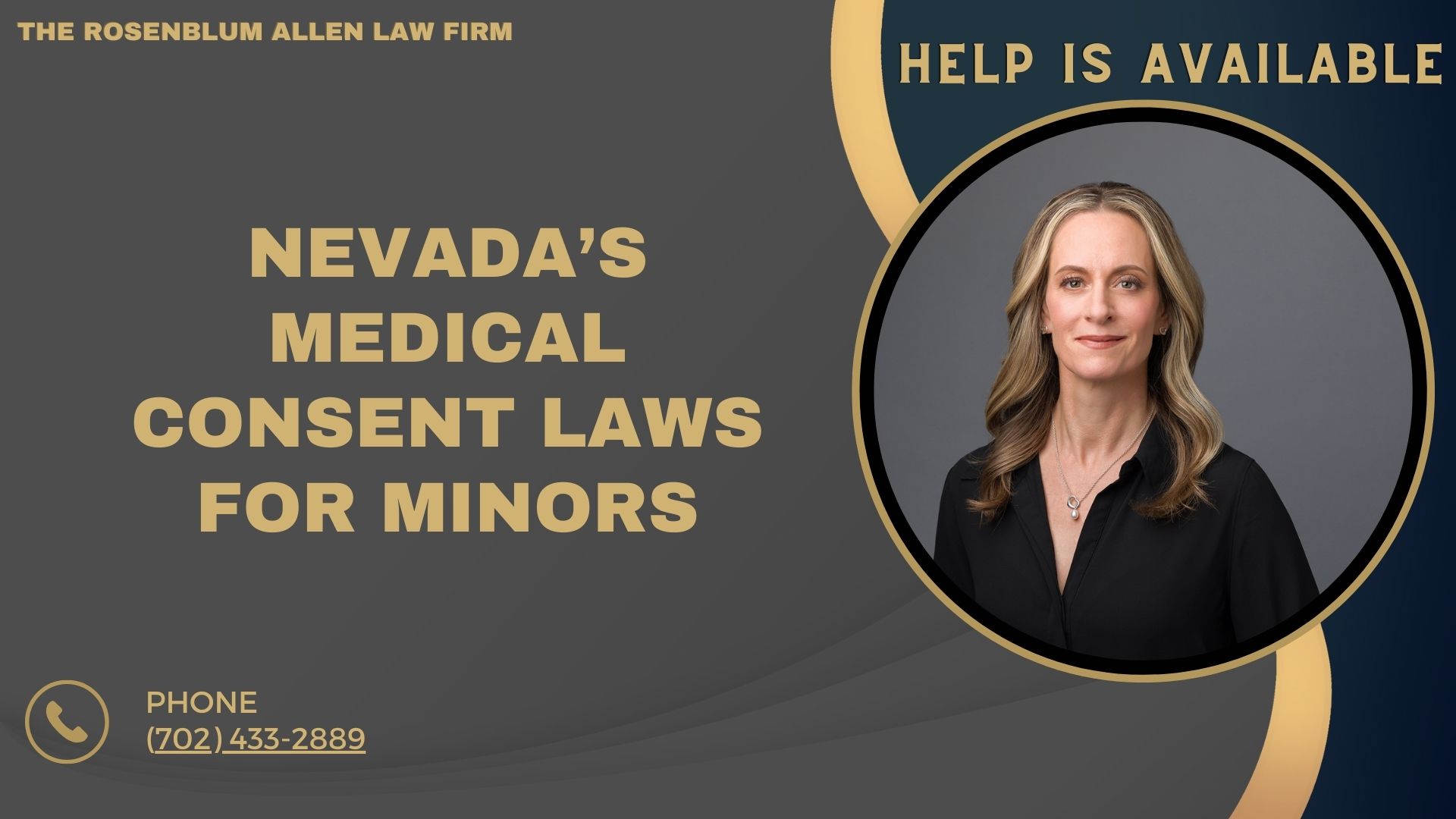Medical consent refers to individuals’ legal and ethical requirements for permission before medical treatment. In Nevada, medical consent laws aim to protect patients’ autonomy, ensuring they have the right to make informed decisions about their healthcare. These laws outline who can consent, under what circumstances, and any exceptions to these requirements.
 Definition of Medical Consent
Definition of Medical Consent
Medical consent is the voluntary agreement to receive medical treatment after understanding the potential risks, benefits, and alternatives. This process involves open communication between the healthcare provider and the patient to ensure informed decision-making.
Importance of Medical Consent in Healthcare Decisions
Medical consent serves several critical purposes:
- Protecting patient autonomy: It empowers individuals to make decisions about their bodies.
- Building trust: Clear consent fosters transparency between patients and healthcare providers.
- Legal compliance: Healthcare providers must obtain consent to avoid legal consequences.
Overview of Nevada-Specific Regulations
Nevada’s medical consent laws align with national standards but include state-specific provisions for minors, emergencies, and specific treatments. The state also recognizes the rights of emancipated minors, incapacitated individuals, and those with advance directives.
Who Can Provide Medical Consent in Nevada?
Adults and Their Rights Under Nevada Law
In Nevada, adults aged 18 and older can provide medical consent for their healthcare decisions. This age of majority is consistent with most U.S. states.
Age of Majority in Nevada
Nevada law defines the age of majority as 18. Once individuals reach this age, they are presumed competent to make medical decisions unless legally declared incapacitated.
Exceptions to Adult Medical Consent Rights
There are specific situations where an adult may not be able to provide consent:
- Incapacity: Adults who are unconscious, mentally incapacitated, or otherwise unable to understand treatment options require a designated surrogate or guardian to consent on their behalf.
- Involuntary treatment: The state may intervene without explicit consent in cases of public health emergencies or mental health crises.
Minors and Medical Consent
In general, minors (individuals under 18 years old) cannot provide medical consent without a parent or guardian. However, Nevada law allows exceptions in certain circumstances.
Parental or Guardian Consent Requirements
Parents or legal guardians must typically provide consent for minors’ medical treatment. This includes routine check-ups, vaccinations, and non-emergency medical procedures.
Situations Where Minors Can Consent to Their Care
Nevada law permits minors to consent to their medical care in the following scenarios:
- Emancipated Minors: Minors who are legally emancipated (through marriage, military service, or court approval) can consent to all medical treatments as if they were adults.
- Married Minors: If a minor is married, they can make their own healthcare decisions.
- Reproductive Healthcare: Minors may access contraception and pregnancy-related care without parental consent. This includes prenatal care but excludes abortion, which has specific requirements under Nevada law.
- Mental Health and Substance Abuse Treatment: Minors seeking counseling, therapy, or addiction treatment may do so without parental involvement in some instances, particularly when they pose a risk to themselves or others.
Legal Limitations for Minors
While minors can consent to specific treatments, there are limitations:
- Some procedures, such as elective surgeries, require parental approval unless the minor is emancipated.
- Abortion access for minors is subject to parental notification laws unless waived by a judicial bypass.

Exceptional Cases in Medical Consent
Medical consent is not always straightforward. Exceptional circumstances arise that require exceptions to the standard rules. These cases often involve emergencies, incapacitated individuals, or unique legal arrangements.
Emergency Medical Situations
Emergencies create situations where obtaining consent may not be possible. Nevada law provides clear guidance to protect both patients and healthcare providers.
What Happens If Consent Cannot Be Obtained?
In life-threatening situations, healthcare providers can proceed without explicit consent to save a patient’s life or prevent serious harm. This principle is known as “implied consent.” It assumes that a reasonable person would want treatment in an emergency.
For example:
- A patient arrives unconscious at the ER after a car accident. Doctors can begin treatment immediately, even if no family member is present to provide consent.
Good Samaritan Laws and Emergency Care Exceptions
Nevada’s Good Samaritan laws protect healthcare professionals and bystanders who provide emergency care from legal liability as long as they act in good faith. This ensures that people can assist without fear of being sued, even if formal consent isn’t possible.
Consent for Incapacitated Individuals
Nevada law allows others to step in and provide consent when patients cannot make decisions for themselves. These arrangements prioritize the patient’s best interests while respecting their rights.
Role of Power of Attorney in Nevada
A medical power of attorney (POA) is a legal document designating someone to make healthcare decisions if the patient becomes incapacitated.
Key points about POAs:
- The designated agent can only act if the patient cannot make decisions.
- The agent must follow the patient’s wishes as stated in advance directives.
Court-Appointed Guardianship
A court may appoint a guardian to make medical decisions if no POA exists. This process is more complex and requires legal intervention. Guardianship is often used for patients with long-term disabilities or severe mental illness.
Advance Healthcare Directives and Living Wills
An advance directive or living will outline a person’s medical preferences if they cannot communicate. These documents can specify:
- Whether to use life-support measures.
- Preferences for pain management or palliative care.
- Instructions for organ donation.
These documents ensure the patient’s wishes are respected, even when they cannot speak for themselves.
Medical Consent for Specific Procedures
Certain medical procedures have unique consent requirements, which vary depending on the type of care and the patient’s circumstances.
Reproductive Healthcare
Nevada has specific rules for medical consent related to reproductive health.
Contraception
Minors in Nevada can access contraception without parental consent. This includes birth control pills, emergency contraception, and other methods to prevent pregnancy.
Abortion Laws and Parental Involvement
Abortion laws in Nevada require parental notification if the patient is a minor. However, there is an exception: minors can seek a judicial bypass to proceed without notifying their parents.
Prenatal Care Consent
Pregnant minors can consent to prenatal care and childbirth services without involving a parent or guardian. This is designed to ensure they receive timely care during pregnancy.
Mental Health Services
Mental health care often involves sensitive consent issues, particularly for minors or those experiencing severe mental health crises.
Counseling and Therapy Consent
In Nevada, minors can consent to counseling or therapy sessions if they are:
- Experiencing suicidal thoughts.
- Facing issues related to abuse or neglect.
- At risk of harming themselves or others.
This ensures that vulnerable individuals can access help quickly.
Inpatient Treatment Consent Requirements
Admission to a mental health facility requires consent from:
- The patient, if they are an adult or an emancipated minor.
- A parent or guardian, if the patient is a minor.
- In emergencies, involuntary admission may occur under Nevada’s mental health laws, but strict guidelines must be followed.
Substance Abuse Treatment
Substance abuse treatment involves its own set of consent rules, especially for minors seeking care independently.
Consent for Detox Programs
Minors in Nevada can consent to substance abuse treatment if they:
- Acknowledge the problem themselves.
- Seek treatment voluntarily.
This allows young individuals to pursue recovery without fear of parental involvement, ensuring timely intervention.
Special Rights for Minors
Nevada law protects minors seeking addiction treatment by maintaining their confidentiality. Providers cannot disclose treatment details to parents without the minor’s permission, except in cases where safety is at risk.

Medical Consent for Non-Citizens and Visitors in Nevada
Nevada’s healthcare system serves residents, tourists, temporary workers, and non-citizens. Medical consent laws apply to everyone, but some unique considerations exist for those visiting or living in the state temporarily.
Rights of Non-Citizens to Provide Consent
Non-citizens, including immigrants and undocumented individuals, have the same rights to medical consent as U.S. citizens. Healthcare providers cannot deny treatment based on immigration status.
For example:
- A non-citizen working in Nevada can consent to surgery or medical care just as any resident would.
- Language or cultural barriers do not diminish their right to make informed decisions.
Consent Laws for Tourists or Temporary Residents
Tourists and temporary residents often face challenges due to unfamiliarity with Nevada’s healthcare system. However, their rights remain protected:
- Visitors can provide consent for treatment during their stay.
- Nevada’s implied consent laws apply in emergencies, ensuring tourists receive necessary care.
Tourists are encouraged to carry travel insurance and have access to identification and emergency contact information in case of unexpected medical issues.
Language Access and Interpreter Rights
Nevada healthcare providers must ensure non-English speakers can understand medical procedures and give informed consent. Patients have the right to:
- Access qualified medical interpreters.
- Request translated documents explaining the risks and benefits of treatments.
This ensures clear communication and respects the patient’s ability to make informed choices.
Legal Consequences of Violating Medical Consent Laws
Failing to follow medical consent laws in Nevada can lead to serious legal and ethical consequences for healthcare providers. These violations undermine trust in the system and may harm patients.
Civil Liabilities for Healthcare Providers
A healthcare provider performing a procedure without proper consent could face civil lawsuits. Patients may sue for:
- Medical malpractice if the procedure causes harm.
- Emotional distress for undergoing unwanted treatment.
- Violation of patient rights, even if no physical harm occurred.
Criminal Penalties for Non-Compliance
Some violations of medical consent laws can lead to criminal charges. For example:
- Performing surgery on a patient who explicitly refused consent.
- Providing medical care to a minor without obtaining required parental or judicial approval.
Penalties could include fines, loss of medical license, or imprisonment in severe cases.
Patient Rights and Recourse Options
Patients who feel their consent was violated have legal recourse. They can:
- File a complaint with Nevada’s Medical Board.
- Seek legal representation to pursue civil damages.
- Report incidents to patient advocacy organizations.
These options help ensure accountability and prevent future violations.

How to Address Medical Consent Issues in Nevada
Medical consent issues can be overwhelming, especially when laws and personal rights clash. Knowing the steps to take can make a difficult situation more manageable.
Steps to Take If Medical Consent Is Violated
If you believe your medical consent rights were ignored, here’s what you can do:
- Document the incident: Write down what happened, including dates, times, and names of involved parties.
- Request medical records: Obtain documentation of the procedure or treatment.
- Speak to a healthcare provider: Ask for an explanation or clarification regarding the incident.
- File a formal complaint: Contact Nevada’s State Medical Board or your healthcare facility’s patient advocacy department.
- Seek legal advice: A lawyer specializing in medical law can help you understand your options.
Hiring Legal Counsel for Medical Consent Disputes
Legal counsel can help you navigate complex medical consent laws. Attorneys can:
- Review your case to identify violations.
- Help file lawsuits or complaints.
- Negotiate settlements or represent you in court.
Choosing a lawyer with experience in Nevada’s healthcare laws is essential.
Resources and Support for Patients
Patients have access to various resources to address medical consent issues, including:
- Nevada State Medical Board: Handles complaints against healthcare providers.
- Patient advocacy organizations like the Nevada Justice Association offer support and guidance.
- Legal aid services: Free or low-cost legal help is available for those unable to afford private representation.

Breaking It All Down
Understanding medical consent laws in Nevada is essential for both patients and healthcare providers. These laws protect individual autonomy, ensure informed decision-making, and provide a framework for handling complex situations, such as emergencies or disputes.
Whether you’re an adult, a parent, a minor, or a visitor to the state, knowing your rights and responsibilities regarding medical consent can make navigating healthcare decisions less stressful. For parents, it’s important to recognize when consent is needed and when minors can act independently. For healthcare providers, following consent laws ensures ethical practice and avoids legal consequences.
If you ever face challenges or uncertainties about medical consent, don’t hesitate to seek help. Legal experts, patient advocacy organizations, and healthcare providers can all offer guidance. Nevada’s laws aim to balance patient rights with practical healthcare needs, ensuring everyone receives the care they deserve while respecting their autonomy.
By staying informed, you can make empowered decisions about your health and the health of those in your care.

Frequently Asked Questions
What Is Medical Consent?
Medical Consent is the legal agreement a patient gives to receive treatment after understanding the risks, benefits, and alternatives. It ensures that healthcare providers respect patients’ right to make informed decisions.
Who Can Provide Medical Consent in Nevada?
- Adults: Anyone 18 or older can provide Consent.
- Minors: Typically, minors require parental Consent, but exceptions exist for emancipated minors, married minors, or specific situations like reproductive healthcare and mental health services.
Incapacitated Individuals: Consent is given by a designated power of attorney, court-appointed guardian, or through advance directives.
Can Minors Consent to Medical Care Without Parental Involvement?
Yes, in certain situations. For example:
- Minors can access contraception, prenatal care, and STI treatment.
- They can seek mental health or substance abuse treatment if they are at risk of harm.
- However, parental notification is required for abortions unless waived by a judicial bypass.
What Happens If a Patient Cannot Provide Consent?
In emergencies, healthcare providers can act under implied Consent if a patient is unconscious or incapacitated. For non-emergencies, Consent may be provided by a power of attorney, guardian, or next of kin.
Do Tourists or Non-Citizens Have the Right to Consent?
Yes, all patients in Nevada—regardless of citizenship or residency status—have the right to medical Consent. Healthcare providers must also ensure clear communication by offering language interpreters when needed.
What Are the Consequences of Violating Medical Consent Laws?
Healthcare providers who fail to obtain proper Consent may face:
- Civil lawsuits for malpractice or emotional distress.
- Criminal charges in cases of serious violations.
- Disciplinary action, including loss of their medical license.
What Should I Do If My Medical Consent Rights Are Violated?
If you believe your rights were ignored:
- Document the incident.
- Obtain your medical records.
- File a complaint with Nevada’s State Medical Board.
- Seek legal advice from an attorney experienced in medical consent cases.
How Do Nevada's Laws Protect Patients in Emergencies?
In emergencies, implied Consent allows healthcare providers to deliver life-saving treatment without explicit approval. Nevada’s Good Samaritan laws also protect individuals providing emergency aid from liability.


If you’re dealing with legal concerns beyond medical consent issues, The Rosenblum Allen Law Firm offers a wide range of legal services to help you. Here are some additional resources that may be helpful, with links to learn more:
Criminal Defense Attorneys
Comprehensive representation for all criminal defense matters, protecting your rights and fighting for the best possible outcome.Las Vegas DUI Lawyer
Experience in handling DUI charges, ensuring you receive a fair trial and working to minimize the consequences.Domestic Violence Lawyer Las Vegas
Skilled legal support for domestic violence accusations, focusing on protecting your reputation and legal rights.Drug Possession Lawyer
Representation for drug-related charges, from possession to trafficking, with a focus on reducing or dismissing charges.Sex Crimes Attorney
Aggressive defense for sex crime allegations, providing sensitive and professional guidance through these complex cases.CPS Defense Attorney
Legal advocacy for parents facing Child Protective Services (CPS) investigations or accusations of abuse or neglect.Misdemeanor Lawyer
Assistance with misdemeanor charges, helping you navigate the legal process and mitigate potential penalties.Las Vegas Warrant Defense Attorney
Guidance for dealing with outstanding warrants, including strategies for clearing your record or minimizing impacts.Las Vegas Probation Violation Attorney
Support for probation violations, working to keep you out of jail and resolve the situation quickly.Theft Crime Defense Lawyer
Defense against theft charges, from petty theft to more serious burglary and robbery accusations.Kidnapping Lawyers
Representation for kidnapping charges, focusing on protecting your rights and building a strong defense.Juvenile Defense Lawyers
Advocacy for juveniles facing criminal charges, helping to protect their future and minimize legal repercussions.Firearms Lawyer Las Vegas
Legal help for firearms-related charges, from unlawful possession to more serious weapon offenses.
These resources are here to help you navigate challenging legal situations. For personalized advice, reach out to The Rosenblum Allen Law Firm directly.

Offsite Resources for You
Here are seven offsite resources that readers may find helpful for learning more about medical consent laws and related topics:
American Medical Association (AMA)
Explore the AMA’s resources on patient rights, informed consent, and medical ethics.
Visit the AMANational Center for Biotechnology Information (NCBI)
Access scholarly articles and research on informed consent and healthcare practices.
Visit NCBINevada Department of Health and Human Services (DHHS)
Learn about Nevada-specific healthcare policies, including patient rights and public health resources.
Visit Nevada DHHSAmerican Civil Liberties Union (ACLU)
Find information on legal protections for patients, including those involving reproductive rights and consent.
Visit the ACLUHealthIT.gov
Discover resources on patient access to medical records and electronic health information.
Visit HealthIT.govPlanned Parenthood
Explore guidance on reproductive health services, patient privacy, and consent for minors.
Visit Planned ParenthoodKidsHealth
Offers easy-to-understand resources for parents and teens on healthcare rights, consent, and treatment options.
Visit KidsHealth
These websites provide valuable insights and guidance on medical consent and patient rights, whether you’re in Nevada or beyond.

A Special Message from Our Lead Attorney, Molly Rosenblum Allen, Esq

Thank you for taking the time to explore these resources. I hope you found the information helpful and empowering. If you’re ready to take the next step, my team and I are here to assist you with your situation. Give us a call at (702) 433-2889 to get the ball rolling. We’re committed to helping you navigate the process and find the best solution.
We look forward to hearing from you!
– Molly





